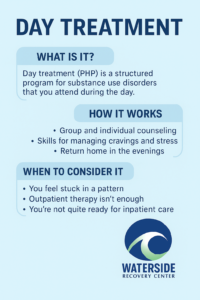If you’ve ever looked at your drinking or drug use and thought, “It’s not that bad” or “I can still handle it,” you’re not alone. But if you’re also starting to feel the strain—physically, emotionally, relationally—you might be more ready for help than you think.
Day treatment offers a powerful in-between option. It’s not residential rehab. It’s not a weekly therapy appointment. It’s structured care without full separation from your life.
At Waterside Recovery, we hear it all the time: “I didn’t think day treatment was for someone like me.” But the truth is, it might be exactly what you need to reset your direction before things get worse.
Let’s break down what day treatment really means—and why it’s an ideal choice for people who are struggling but still trying to convince themselves they’re fine.
1. What Is Day Treatment, Really?
Day treatment (also called PHP, or Partial Hospitalization Program) is a structured outpatient program that provides intensive care during the day while allowing you to return home in the evening.
If you’re looking for a flexible yet effective level of support, a Day Treatment Program in Massachusetts can offer the structure you need without requiring overnight stays.
At Waterside Recovery, day treatment includes:
- Group therapy sessions with licensed clinicians
- One-on-one therapy tailored to your goals
- Medication support if needed
- Wellness and coping skills development
- Evidence-based treatment plans personalized to you
You attend five days a week for several hours a day. It’s immersive, but not isolating. You’re still part of your life—just with way more support.
Many people enter day treatment when they’re:
- Experiencing increasing distress or dysfunction
- Struggling with relapse or cravings
- Needing more than talk therapy, but not full hospitalization
This level of care creates space for clarity, insight, and skills without the disconnection of inpatient settings.
2. It’s Not About Hitting Rock Bottom
You don’t have to be falling apart to qualify for help.
In fact, many people who succeed in day treatment are those who catch themselves before they lose their jobs, families, or health. If you’re experiencing:
- Cravings that keep returning
- Trouble keeping promises to yourself
- A growing sense of anxiety, numbness, or loss of control
- “Functioning” on the outside but overwhelmed inside
…day treatment can help you break the cycle before it breaks you.
We’ve worked with clients who:
- Showed up after multiple “I’ll stop next week” cycles
- Hid their use from loved ones for months or years
- Weren’t sure if they “qualified” for treatment
What they discovered was this: day treatment doesn’t require catastrophe. It welcomes your courage at any stage.
Recovery isn’t about how far you’ve fallen. It’s about how ready you are to rise.

3. It Fits Into Real Life
Day treatment works especially well for people who:
- Want help but can’t commit to inpatient care
- Need structure and accountability to stay on track
- Have responsibilities at home or work
- Are stepping down from a residential program
You can begin treatment in the morning and still have dinner with your family that night. It’s recovery that respects your life—not recovery that demands you pause it.
We also help with logistics like:
- Coordinating with work leave (FMLA support)
- Childcare planning
- Transportation assistance
- Medication management coordination
Because real healing works best when your real life is supported, too.
4. It’s Clinical, Not Just Conversational
This isn’t a support group in a church basement. Day treatment at Waterside Recovery is:
- Clinician-led and evidence-based
- Rooted in neuroscience, trauma theory, and psychology
- Personalized for co-occurring mental health conditions (anxiety, trauma, depression)
- Backed by medical oversight
Your treatment team may include:
- A licensed therapist
- A psychiatric nurse practitioner or prescriber
- Group facilitators
- Case managers to help with outside coordination
Together, they build a care plan that supports your goals—whether that’s sobriety, stability, or self-understanding.
We focus on:
- Identifying the roots of addiction (not just the symptoms)
- Building emotional regulation and resilience
- Helping you reconnect with your own values and voice
5. It’s a Strong Start to Real Change
Day treatment is often the first step toward sustainable recovery. It’s where people move from crisis mode to clarity. From white-knuckling to building real skills.
Clients often say day treatment gave them:
- Language for what they’d been feeling
- Hope they didn’t expect to find
- A clear next step, instead of confusion or shame
We don’t just focus on “quitting”—we focus on transforming your relationship with yourself.
That includes:
- Learning how to cope without numbing
- Rebuilding trust in your own decisions
- Discovering who you are beyond the substance
It doesn’t mean you’re broken. It means you’re ready to try something better.
Frequently Asked Questions (FAQs)
Q: Do I have to stop working to attend day treatment?
Many clients adjust their work schedules temporarily, but it’s not always necessary. We’ll work with you to find a plan that fits.
Q: Is day treatment covered by insurance?
Often, yes. We’ll verify your benefits and explain all costs up front—no surprises.
Q: Will I be around others with severe addiction?
You’ll be with people at different stages, but all are here for structured care. Many are high-functioning and just need deeper support.
Q: What happens after day treatment ends?
We help you transition into outpatient therapy or lower levels of care. You’ll leave with a personalized aftercare plan.
Q: Is this confidential? Will my job or family find out?
Absolutely confidential. We comply with all privacy laws and only release information with your written consent.
Ready to Learn More?
Call (866) 671-8620 or Contact Us to get the full picture.
We’ll talk through your options, answer any questions, and help you decide if day treatment is the right move. No pressure. No labels. Just a real conversation about what’s possible.


